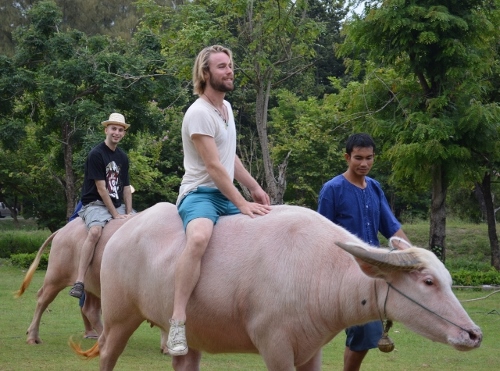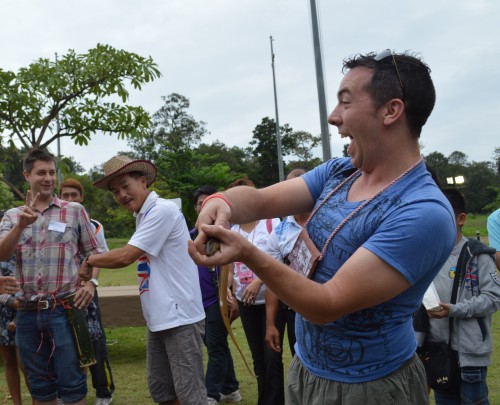
Local foreigners ride albino buffaloes as a part of this past weekend’s Foreigner Friendship Festival in Khon Kaen.
GUEST CONTRIBUTION by Jane Okerman and Hannah Thompson
KHON KAEN – In an effort to restore Thailand’s image abroad after a May 22 military coup, a coalition of local organizations hosted its first Foreigner Friendship Festival last Sunday in front of Khon Kaen University’s Golden Jubilee Convention Hall.
The lighthearted event featured Isaan-themed activities such as buffalo riding, eel catching, displays of Thai boxing and sepak takraw.
According to organizers, the festival aimed to show that Khon Kaen is friendly toward foreigners and to provide foreigners with information from government offices and local businesses.
The idea for the festival originated in Bangkok tourism business circles, according to Josh Macknick, a 34-year-old member of the Khon Kaen Expat Association who served on the festival’s planning committee.
Similar festivals were intended to take place in every province shortly after the coup. But after several months of waiting for funding from Bangkok, organizers in Khon Kaen decided to sponsor the event locally to showcase Khon Kaen as a tourist destination. They reached out to Khon Kaen University, local businesses and private hospitals in the city to help.
 Nationally, Thailand’s tourism market has fallen by 20 percent since the coup in May.
Nationally, Thailand’s tourism market has fallen by 20 percent since the coup in May.
International perceptions of Thailand as a tourism destination were further hampered by the botched murder investigation of two British tourists on Koh Tao in September. The military government has responded by trying to market martial law to domestic and international tourists through campaigns such as “Martial Law Tourism” and “24 Hours Enjoy Thailand.”
Larry Bright, 57, an American expat living in Khon Kaen, is curious whether the festival’s approach will help spark more tourism. “Martial law appears to be subduing tourism a lot, but we are entering high [travel] season so it will be interesting to see if these types of events help encourage people to keep visiting cities,” he said.
The goal of the event was “to have foreigners help spread the word that Khon Kaen and the Northeast of Thailand are peaceful and orderly, and that Khon Kaen is a good place to live and a good environment for investment,” said the Chairman of the Tourist Business Association of Khon Kaen, Kemchart Somjaiwong, a key organizer of this event, in a bulletin issued by the Public Relations Office of Khon Kaen Province.
Original predictions of the budget were estimated above 10 million baht, when initial plans were to include all of Isaan. The festival’s cost is estimated at around 200,000 baht, though it was mostly covered through in-kind donations.
Mr. Macknick was skeptical at first, when he heard in the original plan organizers “wanted to have a blonde- haired dinosaur and a brown-haired dinosaur to represent white people and Thai people.”
Only about 75 people attended the event, far short of the targeted 300. Volunteers attributed low turnout to the lack of advertisement.
Pasuta Sukmamop, 36, a volunteer from Rachawadee Hotel, said that the festival’s biggest shortcoming was the lack of time organizers had to promote the event. But she felt confident that the festivals would be more successful in the future. “Next time it will be huge,” she said.
Mr. Macknick was not bothered by the low turnout. In his view, the festival was “actually very successful in the sense that Thais [in Khon Kaen] are making an effort to create a community with foreigners. Khon Kaen is a small town with a lot of foreigners who don’t go out of their way to interact.”





